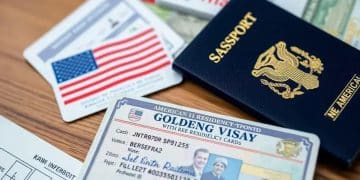& Residency explained USA Visa Gold citizenship Card basics

Understanding Trump’s permanent residency policies reveals stricter vetting processes, the Public Charge rule impacting applicants needing assistance, and the reduced number of refugees admitted, which complicate the immigration journey in the US.
& Residency explained USA Visa Gold citizenship Card basics may sound overwhelming, but it’s key to unlocking opportunities in the US. Are you curious about the options available for residency and citizenship?
Understanding the USA Visa process
Understanding the USA Visa process is essential for anyone looking to travel or move to the United States. Navigating this system may seem daunting, but breaking it down can help.
Types of USA Visas
There are various visa categories to consider. Each type serves different purposes. Understanding the differences can steer you towards the right choice.
- Tourist Visa – Ideal for travelers planning a short stay.
- Work Visa – Required for those looking to work legally in the US.
- Student Visa – Necessary for individuals wishing to study in American educational institutions.
- Immigrant Visa – For individuals planning to live permanently in the US.
Once you’ve identified the appropriate visa type, the next step is the application process. This phase involves submitting your application, supporting documents, and attending an interview at a US embassy or consulate.
Key Steps in the Application Process
Gathering the required documents is crucial. Make sure you have:
- Your passport, which must be valid for at least six months beyond your planned stay.
- Application form filled out correctly.
- Proof of funds to cover your expenses while in the US.
- Documents specific to the visa type you are applying for.
Understanding the USA Visa process can seem complex, but with a clear plan and attention to detail, you can navigate it successfully. It’s crucial to stay updated on any changes in immigration policies that could affect your application.
Benefits of the Gold Visa for residency

The Gold Visa offers numerous advantages for those seeking residency in the United States. This visa type is designed to attract foreign investors and skilled professionals, allowing them to establish a life in the US more easily.
Key Advantages of the Gold Visa
One of the main benefits is the potential for immediate family inclusion. When you obtain a Gold Visa, your spouse and children can often join you. This makes it an appealing choice for families.
- Path to Permanent Residency – Holders can often transition to permanent resident status.
- Access to Education – Residency provides access to quality educational institutions for your children.
- Business Opportunities – Investors can start or expand businesses with more ease.
- Travel Flexibility – With the Gold Visa, you can travel in and out of the US with fewer restrictions.
Another significant advantage is the investment opportunities this visa offers. Investors can engage in various sectors, boosting the economy and creating jobs.
Financial Benefits
There are also financial benefits associated with the Gold Visa. Investors can potentially yield significant profits from their investments, enhancing their financial stability.
Additionally, the residency status can provide a gateway to applying for citizenship, opening more opportunities in the future. It’s essential to consider how these benefits align with your long-term goals.
Requirements for obtaining a citizenship card
Obtaining a citizenship card in the United States requires meeting certain requirements. Each applicant must understand these criteria to ensure a smooth application process.
Essential Qualifications
The first step is to ensure you meet the necessary qualifications. Applicants must typically be:
- A lawful permanent resident for at least five years.
- At least 18 years old at the time of application.
- Able to demonstrate good moral character.
- Proficient in English and knowledgeable about U.S. history and government.
Next, fulfilling residency obligations is crucial. You must have lived in the U.S. for the required time without extended absences, as these could impact your application.
Required Documentation
Gathering the appropriate documents is another vital aspect of the process. Below are some of the essential documents needed:
- Your valid green card or permanent residency proof.
- Application Form N-400, filled out correctly.
- Documentation proving your residency and employment history.
- Two passport-style photos taken recently.
After preparing your application, you will need to submit it to the United States Citizenship and Immigration Services (USCIS). Following submission, expect to attend an interview, where your eligibility and understanding of U.S. civics will be evaluated.
Understanding these requirements can significantly ease the journey toward receiving your citizenship card. Meeting each obligation and providing the necessary documents can lead to a successful application outcome.
Navigating Trump’s permanent residency policies

Navigating Trump’s permanent residency policies can be challenging due to the changes that occurred during his administration. Understanding these policies is essential for anyone seeking to gain residency in the United States.
Key Changes in Immigration Policy
Several significant changes were implemented that impacted how applicants approach permanent residency. One focus was on stricter vetting processes, which included extensive background checks.
- Public Charge Rule – This rule made it more difficult for individuals who might require public assistance to gain residency.
- Travel Bans – New protocols affected travelers from specific countries, complicating immigration for many.
- Decreased Refugee Admissions – The number of refugees welcomed into the US was reduced, affecting humanitarian immigration.
Understanding these policies helps potential applicants prepare for the application process. It’s crucial to recognize the importance of being well-informed and having complete documentation.
Application Strategies
Given the shifting landscape, applicants must develop effective strategies. One critical aspect is ensuring all paperwork is accurate and filed on time. Additionally, using the help of legal counsel can provide an advantage.
Being proactive in gathering supporting documents is vital. This includes employment records, tax returns, and proof of residency. Staying updated on any changes in policies ensures applicants remain prepared to adapt their strategies as needed.
In conclusion, understanding the nuances of Trump’s permanent residency policies is crucial for anyone aiming to navigate the immigration system. By being well-informed and prepared with the right documents, applicants can enhance their chances of success. Staying updated on policies and seeking legal guidance can make a significant difference in your journey to becoming a resident. The process may seem overwhelming, but with the right knowledge, you can confidently approach your application and work towards your goal of permanent residency.
FAQ – Navigating Trump’s Permanent Residency Policies
What are the main changes in immigration policy under Trump?
The Trump administration introduced stricter vetting processes, the Public Charge rule, and reduced refugee admissions.
How does the Public Charge rule affect my immigration application?
This rule makes it harder for individuals who may need public assistance to gain residency, emphasizing self-sufficiency.
Should I seek legal help for my immigration application?
Yes, consulting with an immigration attorney can provide valuable guidance and help navigate the complexities of the application process.
How can I stay updated on immigration policies?
Regularly check the USCIS website and other reliable sources for the latest updates and changes to immigration regulations.





